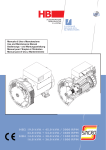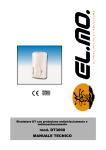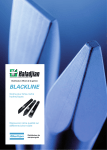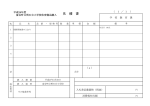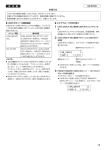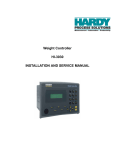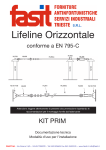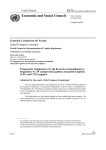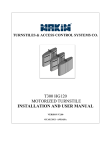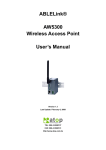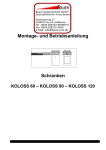Download RHI Accreditation Application Guidance Note
Transcript
Applicant Guidance Note 2 Guide to the RHI Application Form Renewable Heat Incentive - Guide to the Application Form Applicant Guidance Note 2 (30 April 2013) This Guidance Note covers all the general application questions and technology specific questions for applicants applying for full accreditation on the following technologies: Solar Thermal; Heat Pumps; Biogas; Solid Biomass. Please be advised that this note does not cover either preliminary application questions, or questions specific to Biomethane or Geothermal technologies. Contents Section 1: Introduction Section 2: 2.1 General Application Questions 2.2 Documents to be Uploaded Section 3: Technology Specific Questions 3.1 Solar Thermal 3.2 Heat Pumps 3.3 Biogas 3.4 Solid Biomass This section details the general questions, which will be asked on each application This section details questions specific to the technology of your installation. Introduction This Guidance Note is designed to help you provide a complete and high quality RHI application to Ofgem E-Serve, and should be read before completing the RHI application process on the RHI Register. You can access the RHI Register from the RHI web pages. The questions highlighted light blue should be given particular attention. 1 Applicant Guidance Note 2 Guide to the RHI Application Form General Application Questions IT system help text (you will see this help text when you are completing the question) Question Reference Question HAO99 Is the address where your installation is physically located in England, Scotland or Wales, or alternatively is it in Northern Ireland? HA100 Please enter the name of the installation or Name of installation biomethane plant. It may be helpful to make the installation name specific e.g. by using the project, Provide a unique building(s) served by the installation or location name. This is especially name important if you will have multiple RHI applications for the same site. HA110 Please select your installation’s technology, or if you are applying for a biomethane plant See Chapter 3 of RHI Guidance Document Volume 1, for a list of eligible Select correct technologies: technology from list Please enter the installation capacity in kWhth For installations comprised of multiple plants, please enter the combined installation capacity of all plants for which you are applying State the capacity of your installation. Please make sure the capacity stated on your boiler plate or manufacturer's user manual is in kW, rather than MW. If the number is in MW, you can convert to kW by multiplying the capacity by 1000. This number must be an integer i.e. no decimal places or fractions. If your installation is solar thermal or anaerobic digestion and has no nameplate efficiency, please enter 0. The nameplate efficiency of your installation should be included in the manufacturer’s information. If your system does not have a nameplate efficiency because it is bespoke, please estimate to the best of your ability your system efficiency. This should be a 2 digit integer for all technologies other than heat pumps; for heat pumps please For heat pumps, evidence will be required to demonstrate the C.O.P. state the Coefficient of Performance (C.O.P.) i.e. a number to 1 d.p. HA120 & HA130 HA150 Please enter the name plate efficiency (or the system efficiency) of your installation as a percentage. If your installation is a heat pump, please enter the coefficient of performance if it is available. Answer Tips Comments, references You will be able to select from drop down boxes to highlight the correct geographical area RHI Guidance Volume 1 This must be the total installed peak heat output capacity value for the plant, independent of factors such as fuel actually used. You are asked to answer this value twice to confirm it is correct. If there are 2 heat generating plants of the same technology attached to the same heating system, the capacity should be the combined heat output capacity of both plants. For biogas applicants, read our RHI Frequently Asked Questions (no. 33) RHI FAQs Top 2 Applicant Guidance Note 2 Question Reference If answer to HB100 is "No": If answer to HB100 is "Yes": HB100 Question Was your installation carried out by a Microgeneration Certification Scheme (MCS) installer? IT system help text (you will see this help text when you are completing the question) Answer Tips For more information on MCS: Guide to the RHI Application Form Comments, references These details will be displayed on your MCS Certificate MCS Website HB110 What is your MCS Installer Certificate number? If you are applying for an installation comprised of multiple plants, please only enter one MCS certificate number here and the rest when you are asked to provide a description of the installation towards the end of the application. HB120 What is the MCS Certificated Company name? These details are displayed on your MCS certificate. HB130 What is the MCS Certificated Product Number? These details are displayed on your MCS certificate. HB140 What is the estimated annual generation ? These details are displayed on your MCS certificate. HB150 Are both the product and installer accredited under EN45011? HB160 What is the name of the EN45011 accredited scheme? HB170 What is the Manufacturers Product name? HB180 Please provide the following information: Installation company name, address, phone number and name of installer used If you are using an installer and product that are not MCS, they must be accredited under the European Standard EN45011. Ofgem may ask you for evidence to prove that both your installer and product are accredited under EN45011. These details will all be displayed on your MCS Certificate. If you have details of more than one MCS certificate, please enter these within question HK120. Please ensure that this information is consistent with other information provided within your application. If there is a discrepancy please discuss this with your MCS installer before submitting your RHI application. Request these details from your EN45011 accredited installer You should request these details from your EN45011 accredited installer Free text Top 3 Applicant Guidance Note 2 Question Reference HC100 Question Was the installation (including all plants comprising the installation) new at the time of completion and first commissioning? IT system help text (you will see this help text when you are completing the question) “Plant” is defined in the 2008 Energy Act as “any equipment, apparatus or appliance”. If you have two or more plants of the same technology type connected to the same heating system then we may consider all of these plants as one installation for RHI purposes. Guide to the RHI Application Form Answer Tips Comments, references You may be requested to provide evidence of this e.g. an invoice from the supplier of your installation Select: Yes/No Please see Chapter 4, Vol.1: RHI Guidance Document for details of what equipment forms part of an eligible installation for each technology: RHI Guidance Volume 1 If answer to HC110 is a future date: HC110 HC120 HC125 The date on which an installation is first commissioned is the completion of such procedures and tests as constitute, at the time they were undertaken, the usual industry standards and practices for commissioning that type of installation in order to demonstrate that it is capable of operating and delivering heat to the premises or process for which it was installed. If your installation is below 45kW in size (capacity) and certified by MCS, this date will be on your MCS certificate. This approach will be outlined in Ofgem E-Serve's Guidance. We require hover help text for this question: "For installations comprised of DD/MM/YYYY multiple plants, please enter the earliest commissioning date of all the plants. Further dates can be provided in the free text question towards the end of the application. Please enter the date on which the installation was first commissioned or the date the biomethane producer first injected into the grid. If your installation is a CHP system, this should be the date when the heat recovery system For installations comprised of multiple plants, please enter the was first commissioned. earliest commissioning date of all the plants. Further dates can be provided in HK120. If your installation has not yet been commissioned and you do not have a planned commissioning date, please enter an estimated date that is more than one month from the current date. If you have an MCS or commissioning certificate, you should upload this in the supporting evidence section. It is important that you provide the most accurate estimate for your commissioning date, and please note that Ofgem cannot accredit the installation until it is commissioned. Based on the answers provided, you can only apply for preliminary accreditation. Please select "Yes" if you are happy to proceed with this application otherwise select "No" to cancel the application. Select: Yes/No If you have preliminary RHI accreditation for this installation, please enter the relevant RHI number here. Enter number of Only enter an RHI number in this field if you previously submitted an application previous for preliminary accreditation; you should enter the RHI number for that application application This question appears if the system detects your commissioning date is in the future and your installation is eligible for preliminary accreditation. The application is cancelled if "No" is selected. Top 4 Applicant Guidance Note 2 Question Reference Question HC130 Is the address of the installation/ biomethane production plant the same as the account address? HC140 - HC200 HD100 HD110 HD120 Please enter the installation address Please enter the Standard Industrial Classification (SIC) code for the primary heat use supplied by the installation. If the SIC for the prospective RHI participant is different to the code for the primary heat use supplied by the installation, please enter the SIC code for the prospective participant Has a public funded grant been offered in relation to this renewable heat installation? IT system help text (you will see this help text when you are completing the question) Guide to the RHI Application Form Answer Tips Select: Yes/No Comments, references The account address is the organisation address added by the Authorised Signatory during account creation. If applying for an installation comprised of multiple plants located at different addresses, please enter the primary address Enter address of This field should relate to the address of installation, rather than business or here and secondary addresses in the free text question towards installation home address of applicant the end of the application. "Standard Industrial Classification": The UK Standard Industrial Classification of Economic Activities (UK SIC) is used to classify business establishments and other statistical units by the type of economic activities they are engaged in. You can find the SIC relevant to you by following this link: Standard Industrial Classification Select relevant SIC for primary use from list; if you cannot immediately see a relevant SIC for your If no code seems to apply to installation, select "Other" installation, you should scroll down through the list to find the relevant code Select relevant SIC for secondary use, from list; if you "Standard Industrial Classification": The UK Standard Industrial cannot Classification of Economic Activities (UK SIC) is used to classify immediately see business establishments and other statistical units by the type a relevant SIC of economic activities they are engaged in. You can find the SIC If no code seems to apply to installation, select "Other" for your relevant to you by following this link: installation, you should scroll down through the list to find the relevant code Standard Industrial Classification A “grant from public funds” means a grant made by a public authority or by any person distributing funds on behalf of a public authority. Please note that if we discover at a later date that information provided about grants at accreditation is incorrect, we will consider this to be fraud against the scheme and will take enforcement action against the participant. Select: Yes/No Please answer 'yes' if you have received a grant from public funds even if you have repaid or plan to repay the grant. This will not affect your ability to progress through the application form. Please refer to Chapter 4 of RHI GuidanceVolume 1 for more information on grants: RHI Guidance Volume 1 Top 5 Applicant Guidance Note 2 If answer to HD120 is "Yes": Question Reference IT system help text (you will see this help text when you are completing the question) Answer Tips Has the total value of the grant been repaid and grant offer rejected? Select: Yes/No Is the installation or biomethane plant owned jointly with any other party(s)? Select: Yes/No HD150 Do you have the consent of the other parties to apply for the RHI with Proof of consent (e.g. written agreement) may be requested as respect to this part of auditing and compliance installation or biomethane plant? Select: Yes/No HD160 Please provide details of Name, address, and contact details of each owner required other owner (s) Text HD130 HD140 If answer to HD140 is "Yes": Question Guide to the RHI Application Form Comments, references If the answer to this question is "Yes", you will be required to demonstrate evidence of this. Please upload a relevant document in a supporting evidence section towards the end of the application. For further information on how to repay your grant, please visit the Ofgem website. RHI Grant Repayment Guidance Note HD170-1 Please select the type of premises in which heat from the installation (for which you are applying) is used. Please upload evidence of non-single domestic status at the document uploads at the end of the application (e.g. Business Rates bill, multiple Council Tax bills or similar evidence). Select correct option(s) from list HD170-2 If other please specify Text List with the following options - Single domestic premises (i.e. the installation supplies heat to one house/flat) - More than one domestic premises, (e.g. the installation supplies heat to several houses/flats via a common heating system) - One or more commercial premises e.g. office - One or more community premises, e.g. school, hospital - One or more industrial - premises, e.g. farm, factory - Multiple premises of different types - Other If you have selected "Other" provide a clear explanation of the type of premises in which heat is used here. Top 6 Applicant Guidance Note 2 Question Reference HE100 If answer to HE100 is "Yes": HE110 Question IT system help text (you will see this help text when you are completing the question) Answer Tips Is your installation a CHP A plant is a CHP plant if it generates heat and electricity. plant? Select: Yes/No Is the installation currently registered as a CHP generating station under the Renewables Obligation (RO)? Select: Yes/No The Renewables Obligation is a Government support scheme administered by Ofgem to encourage the generation of renewable electricity. See: Guide to the RHI Application Form Comments, references Unless your installation also generates electricity as well as heat, select, "No" Ofgem Renewables Obligation Information HE120 Please enter the generating station's name and accreditation number under the RO. HE130a If the system was registered with the Combined Heat and Power Quality Assurance (CHPQA) scheme CHPQA is the Combined Heat and Power Quality Assurance between 15th July 2009 Scheme overseen by DECC. See the following link and our RHI and the date of guidance document for further details. commencement of the GB RHI, i.e. 28 November 2011, please enter the relevant CHPQA reference number. HE130b Please enter the date on which the CHPQA Enter date registration commenced. registration commenced Text/Number Text/Number A CHP plant will not be eligible for the RHI where it is fuelled by solid biomass (including solid biomass contained in municipal waste), is accredited under the Renewables Obligation and has at any point since receiving that accreditation been a 'qualifying CHP' generating station within the meaning of the Renewables Obligation Order. DECC CHPQA DD/MM/YYYY The date entered cannot be later than the date of commencement of the GB RHI regulations. *Question sections HF-HG are included below in the technology specific section of this guidance note Top 7 Applicant Guidance Note 2 Question Reference Question IT system help text (you will see this help text when you are completing the question) Answer Tips Guide to the RHI Application Form Comments, references Heating a space: the heating of rooms or other enclosed spaces within buildings, typically through the supply of hot liquid to heat emitters, such as radiators and underfloor heating. HH100 Please select how the heat generated by your installation is used. Please select all the options that apply to you. If 'none of the above' please state how the heat generated is used. Heating water: the heating of water for direct use, such as commercial and industrial hot water or for use in schools or hospitals. Heating hot water for domestic use is also permitted, provided that the eligible installation does not provide heat solely to a single, domestic premises. Carrying out a process (other than generating electricity): the use of heat to carry out a specific process such as industrial cooking, drying, pasteurisation or chemicals manufacture. It also includes heat that is subsequently used for cooling, e.g. passing renewable heat through absorption chillers. It does not include heat used for the generation of electricity. Space heating; Water heating; Process heating; None of the above Select correct option(s) from list To select more than one answer please hold the Ctrl key and select the options required. If "none of the above", please refer to Vol.1: Renewable Heat Incentive Guidance Document to determine whether or not your heat use is eligible for the RHI scheme. To select more than one answer please hold the Ctrl key and select the options required. Top 8 Applicant Guidance Note 2 Question Reference HH110 Question IT system help text (you will see this help text when you are completing the question) In order to be considered for ‘simple’ metering, the following statements (a) and (b) must both apply to your application. Declare ‘yes’ to question ‘HH 110’ if both statements (a) and (b) are correct: a. The heat generating plant for which you are making this RHI application is located in the same building as all the uses of the heat produced and these heat uses are eligible i.e. space, water Is the heat generating or process heating. plant for which you are b. All heat produced by the heat generating plant for which you making this RHI are making this RHI application is used in the same building, application located in with no external heat distribution pipework. the same building as all Declare ‘no’ if either of the following two statements is correct: the uses of the heat c. The heat generating plant for which you are making this RHI produced by the plant, application is not situated within the same building in which all with all these uses heat produced from the plant is used e.g. it is located in a being eligible? Only dedicated boiler house. answer ‘Yes’ here if d. The heat produced from the heat generating plant for which there is no external you are making this RHI application is used in more than one heat distribution building, you have external heat distribution pipework or heat is pipework or ineligible supplied to an ineligible use. uses of heat. If either one of statements (c) or (d) applies you will be classed as ‘complex’ for metering purposes. Note that ‘building’ is defined within the Renewable Heat Incentive regulations. If you are unsure as to the answer to this question please make contact with the RHI operational team. Eligible uses are space, water or process heating. Answer Tips Guide to the RHI Application Form Comments, references You should only answer ‘yes’ to this question if there are no ineligible uses of heat produced from the installation and no external heat distribution pipework e.g. between buildings, of any length. It is essential that this question is answered correctly as it ensures the RHI Register is able to correctly classify the application as falling under the ‘Simple’ or ‘Complex’ metering requirements (as outlined in chapter 7 of Volume 1 of the guidance). Select: Yes/No If there is any external pipework between buildings (including insulated or buried pipework), or any ineligible heat use, please select "No" to this question. External pipework includes: - any external pipework between the boiler house and the building(s) where the heat is used; - as well as pipework between any ineligible heat generating plants and the building(s) where the heat is used, if they are connected to the same heating system as the biomass boiler You should provide as much information as possible in this section including: Please further describe how heat generated by your installation is used. Where appropriate, this should include: HH120 - A description of any ineligible heat uses supplied by the heating system, and how the metering arrangements will ensure heat supplied to such uses will not be included in the meter readings submitted for RHI payment purposes Free Text - Details of any heat customers to which heat is supplied for separate use - A brief description of the building or enclosed structure(s) in which the eligible heat is used - a description of the building(s) in which heat is used. Especially in relation to whether they are fully enclosed on all sides and permanent / long lasting. - whether or not there are any air vents supplying the building - whether or not your boiler is located in its own boiler house, separate from the building(s) where the heat is being used - the total number of buildings to which the heat is supplied - details of any ineligible uses of heat e.g. what they are and how metering arrangements will ensure that heat supplied to such uses will not be included within the Eligible Heat Output (EHO) figure on which the RHI is paid. Under normal circumstances ineligible heat uses are not required to be metered for RHI purposes. Please note that losses in external heat distribution pipework are considered an ineligible use. Top 9 Applicant Guidance Note 2 Question Reference HH130 Question IT system help text (you will see this help text when you are completing the question) Please enter the average hours each week that your installation operates for. Guide to the RHI Application Form Answer Tips Number: must be between 0 and 168 Comments, references Please provide an estimate for the number of hours that the installation will be in operation for in a typical week. If the installation is in continuous operation, you should input, "168". If use of the installation varies on a seasonal basis, then please provide your best estimate of the average number of hours that the installation is in use for in a week. For example, if the only heat use was space heating for ten hours per day during a six month heating season you should select '35'. The total number of hours in a year would be 10 (hours per day) x 30 (days per month) x 6 (months) = 1800 hours. This on average is 34.6 hours per week; 1800 hours / 52 (weeks per year). HI100-1 Please enter the number of relevant hot water meters for the heating system to which your installation delivers heat. Heat meter: this is a meter that measures the energy in a hot liquid. All heat meters used for RHI purposes must meet the technical requirements specified in the Regulations. See Guidance document for further information. Number For every meter declared here, you will be required to take meter readings for periodic data purposes. You will also be required to upload evidence to show that each heat meter is of Class 2 accuracy under annex MI-004 of the Measuring Instruments Directive (MID). If you have meters on your system that are not required for the purposes of the RHI i.e. they do not form part of your payment formula. Do not include them here. HI100-2 Please enter the number of relevant steam meters for the heating system to which your installation delivers heat. Steam meter: this refers to the equipment used to measure the energy in steam. All steam meters used for RHI purposes must meet the technical requirements specified in the Regulations. See Guidance document for further information. Number See above HI102b Based on the answers provided, the RHI legislation requires you to be classed as (Simple/Complex) for metering purposes. This will affect the number of meters you require for RHI purposes, and where they need to be positioned. Please refer to guidance and available applicant information. The response to this question is automatically generated, based on the information provided on your application. You must accept the stated metering designation by answering 'Yes'. There is no need to fill in any information in this section; the response (which tells you if your system if "simple" or "complex") is automatically generated by the system, based on the answers you have provided in your application form. You will need to tick the box to acknowledge the response here. Please refer to Chapter 7 of RHI Guidance Volume 1to ensure you understand the requirements of Simple/Complex metering requirements. RHI Guidance Volume 1 Top 10 Applicant Guidance Note 2 Question Reference Question IT system help text (you will see this help text when you are completing the question) Answer Tips Guide to the RHI Application Form Comments, references HI120a-1* Please enter the meter manufacturer and model. If not a packaged The meter is a packaged unit if the integrator/display is unit, enter the mounted directly onto the flow meter. manufacturer model of both the integrator and the flow meter. Heat meter: Manufacturer and Model, or Integrator: Manufacturer and Model & Flow meter: Manufacturer and Model Enter the manufacturer and model for the calculator, also know as digital integrator: this is the digital box displaying the meter readings) and the flow meter (this is the sensor mounted in the pipe measuring the flow in the pipe). This information may be found on documentation supplied by the manufacturer of the meter, or on the calculator / flow meter itself. It is a eligibility requirement of the RHI scheme that the heat meter (and all components thereof) has Class 2 accuracy under annex MI-004 of the Measuring Instruments Directive (MID). If your meter is 'packaged' you will just need evidence to prove the meter as a whole meets the MID Class 2 criterion. 'Packaged' meters, sometimes called "compact" meters, will be supplied as a connected set of components with one model name / number and will come from a single manufacturer. If this is not the case you must provide evidence that the calculator and flow sensor individually meet the MID Class 2 criterion. All heat meters utilised for RHI purposes must meet the MID Class 2 requirement. HI130a-1* Please enter the meter serial number. If not a packaged unit, enter the If you don’t have a package meter, please enter for your flow manufacturer and model meter component of both the integrator and flow meter. Heat meter: Serial Number, or Integrator: Serial Number & Flow meter: Serial Number Enter the serial number for the calculator, also know as digital integrator: this is the digital box displaying the meter readings) and the flow meter (this is the sensor mounted in the pipe measuring the flow in the pipe). This information may be found on documentation supplied by the manufacturer or on the label of the calculator / flow meter itself. HI140a-1* Please provide a brief description allowing this meter to be identified on the schematic diagram. For steam meters, please include a description of the type of volumetric flow meter used. Text State what the meter in question is measuring, e.g. heat from the eligible biomass boiler, heat from back up oil boiler, space heating for building X etc. This will allow Ofgem E-Serve to clearly identify each meter on the application and link it to the schematic provided. Each meter should be included within the schematic provided in support of your application. Top 11 Applicant Guidance Note 2 Question Reference HI150b-1 Question IT system help text (you will see this help text when you are completing the question) Please provide a meter reading in kilowatthours (kWh). If this is not your fisrt submission of this application then please do not change this meter reading unless agreed with Ofgem. This reading Meter reading must be within 3 days of the application may need to be updated submission date. if, for example, you have made changes to metering requiring new readings, or your installation, heating system or application information has undergone significant amendments. Guide to the RHI Application Form Answer Tips Comments, references This meter reading must be taken no earlier than 3 days prior to the date you submit your application. Please check the date of this reading before submitting your application. If your meter reading is more than three days prior to the date of first submission Ofgem E-Serve will request that a new meter reading is taken. This may alter the date to which we backdate your payments, once you have been accredited onto the scheme. Please ensure your heat meter is reading in kWh, rather than MWh. If your meter is displaying heat flow in MWh this should be changed to a kWh setting. If you Number (kWhth) are unable to alter the display of your heat meter, you can manually calculate the reading in kWh, by multiplying your MWh reading by 1000. N.B. If you have 10 or more heat meters installed in your system, you will not be asked to supply meter readings; instead you will need to upload a metering spreadsheet, which will include meter readings, using the template from our website: RHI Meter Spreadsheet HI151 Please provide the date on which this reading was taken. This should Date must be in correct format: DD/MM/YYYY. It must not be a be no more than 3 days future date, but it must be a past date within 3 days of the before the date on which application submission date. the application is submitted to Ofgem. *Questions repeated for the no. of meters listed - if there are more than 10 heat meters listed, applicant will be required to upload a metering spreadsheet HJ100 Please enter the number of other heat generating plants that are connected to the same heating system as the installation for which you are making this application Heat generating stations include, for example, fossil fuel back up boilers, fossil fuel top up boilers,immersion heaters, renewable heat installations (which have or have not been RHI accredited etc). Number (Up to 5 installations) This includes other renewable technologies, regardless of whether they have been accredited to the RHI or otherwise, as well as any ineligible technologies (including electrical immersion heaters). It is important we know the total number of ‘other’ plants which are connected to the same heating system in order that the proposed metering of these can be verified. If plant is still operational and technically capable of providing heat to the heating system it should be declared here and not in HJ170 You should only mention other heat generating plants which are connected to the same heating system as your eligible heat generating plant. Top 12 Applicant Guidance Note 2 If answer to HJ100 >5: If answer to HJ100 >0 (questions HJ110 - HJ150 will be repeated for the number of plants stated in HJ100; questions HJ110 - HJ150 will be repeated up to 5 times): Question Reference Question IT system help text (you will see this help text when you are completing the question) Answer Tips Guide to the RHI Application Form Comments, references CHP gas; Non-CHP gas; CHP oil; Non-CHP oil; CHP coal; Non-CHP coal; Biogas; Solid biomass boiler; Deep geothermal; Ground source heat pump (GSHP); Municipal Solid Waste; Solar thermal; Water source heat pump (WSHP); Biomethane; Other Non-renewable; Other renewable HJ110a-1 Please enter the technology type of each plant Select correct option from list HJ110a-2 If other please specify Text Provide more information on the other technology Please enter the capacity of each plant (kWth) Number Enter capacity of each non-RHI accredited heating plants in kW Select correct option(s) from list You can select more than one answer for this question. To select more than one answer please hold the Ctrl key and select the options required. The answer options available are: - Space heating - Water heating - Process heating - None of the above Text This question will only be asked if there are more than 5 additional heat generating plants HJ120a HJ150a Please describe how the heat generated by this plant is used HJ160 Please provide details of the heat generating plants, including their capacities, technology types, make and model; and a brief description of what the heat the plants generate is used for. To select more than one answer please hold the Ctrl key and select the options required. You can select more than one answer for this question, by holding down the 'Ctrl' key; if you have an electrical immersion heater, which is supplying heat to the same heating system as your eligible technology, please select "Other Nonrenewable" Top 13 Applicant Guidance Note 2 Question HJ170 Please enter the number of heat generating plants (renewable or nonrenewable) that this installation is replacing If answer to HJ100 >3: If answer to HJ170 >0 (questions HJ180 - HJ200 will be repeated for the number of plants stated in HJ170; questions HJ180 - HJ200 will be repeated up to 3 times): Question Reference HJ180 Please enter technology type of previous plant(s) IT system help text (you will see this help text when you are completing the question) Answer Tips Number Guide to the RHI Application Form Comments, references Where plant has been completely decommissioned and is no longer capable of providing heat to the heating system, and so has been wholly replaced by the installation you are applying for, it should be declared as ‘replaced’ here. In this case we will know it does not require a meter. If it has been retained as back up but is still capable of operating it should be declared at HJ 100. The system should cater for details of up to 3 previous installations Select correct option from list: CHP gas; Non-CHP gas; CHP oil; Non-CHP oil; CHP coal; Non-CHP coal; Biogas; Solid biomass boiler; Deep geothermal; Ground source heat pump (GSHP); Municipal Solid Waste; Solar thermal; Water source heat pump (WSHP); Biomethane; Other Non-renewable; Other renewable If you have an electrical immersion heater, which is supplying heat to the same heating system as your eligible technology, please select "Other Non-renewable" HJ190 Please enter capacity of previous plant(s) in kWth HJ200 Please provide details of the plants, including the technology type and capacity of the plants Number Enter capacity of each heating plant, which the installation is replacing, in kWhth Only asked if you entered more than 3 in HJ160 Top 14 Applicant Guidance Note 2 Question Reference IT system help text (you will see this help text when you are completing the question) Answer Tips Does the installation export heat offsite? Select: Yes/No HJ220 How many properties are served by the installation? Number HJ230 Are there individual meters measuring heat supply to each property or properties? Select: Yes/No HJ240 What percentage (to the nearest 5%) of the heat generated by the eligible installation is exported? HJ250 What percentage (to the nearest 5%) of the heat generated by the eligible installation is used on site? HJ260 What temperature heat is used in the network? (ºC) Positive integer, non-zero HJ270 Are you looking to expand the network? Select: Yes/No HJ280 Are you a private sector ESCO or a public sector ESCO? HJ210 If answer to HJ210 is "Yes": Question Guide to the RHI Application Form Comments, references If you are unsure whether or not you are exporting heat offsite, please contact a member of the RHI team on 0845 200 2122 Please refer to Volume 1 of the Guidance for further information on our interpretation of domestic and non-domestic RHI Guidance Volume 1 % figure, Nonzero If you do not know the answer to any of these questions, please refer to your installer, or contact the RHI enquiry line for assistance. % figure, Nonzero Select: - private sector ESCO - public sector ESCO The acronym, "ESCO", stands for "Energy Service Company". Top 15 Applicant Guidance Note 2 Question Reference Question IT system help text (you will see this help text when you are completing the question) Guide to the RHI Application Form Answer Tips Comments, references State Aid 'Large undertakings' are defined in the State Aid Environmental Protection Guidelines as “enterprises which are not within the definition of small and medium-sized enterprises”. The definition of small and medium-sized enterprises is “such enterprises within the meaning of Regulation (EC) No 70/2001 or any regulation replacing it”: 1. Small and medium-sized enterprises, hereinafter referred to as 'SMEs', are defined as enterprises which: - have fewer than 250 employees, and - have either, - an annual turnover not exceeding EUR 40 million, or - an annual balance-sheet total not exceeding EUR 27 million, - conform to the criterion of independence as defined in paragraph 3. HJ290 Are you/your organisation a 'large For a definition of large enterprises please refer to the RHI enterprise' as defined by Glossary document State Aid rules? 2. Where it is necessary to distinguish between small and medium-sized enterprises, the 'small enterprise' is defined as an enterprise which: Select: Yes/No - has fewer than 50 employees and - has either, - an annual turnover not exceeding EUR 7 million, or - an annual balance-sheet total not exceeding EUR 5 million, - conforms to the criterion of independence as defined in paragraph 3. 3. [An independent enterprise is one in which no more than 25% (of the capital or voting rights) is owned by either one enterprise, or jointly by several enterprises, that fall outside the definition of an SME or small enterprise, whichever may apply.] This threshold may be exceeded in the following two cases: - if the enterprise is held by public investment corporations, venture capital companies or institutional investors, provided no control is exercised either individually or jointly, - if the capital is spread in such a way that it is not possible to determine by whom it is held and if the enterprise declares that it can legitimately presume that it is not owned as to 25 % or more by one enterprise, or jointly by several enterprises, falling outside the definitions of an SME or a small enterprise, whichever may apply HJ300 Please enter the capital cost of your renewable heat installation. This will include costs relating to the purchase or construction of the physical equipment but should exclude VAT. (£) This information is required for monitoring purposes. This information will only be reported in aggregate to preserve commercial sensitivity. 7 digits and 2 decimal places Please provide an estimate of the cost of the installation itself quoted on your invoice from the installer or supplier of your installation. For further information on which costs to include please refer to Table 3, Chapter 4 of RHI Guidance Volume 1. This contains what is considered 'integral equipment' for each RHI eligible technology type. The total cost of all integral equipment should be provided. Top 16 Applicant Guidance Note 2 Question Reference Question IT system help text (you will see this help text when you are completing the question) Answer Tips HJ305 Free text: e.g. Please describe how the purchase and installation of the through a loan, How has the purchase renewable heat installation for which you are making this from your own and installation of your application has been financed. For example it may be through a reserves, from installation been funded? loan, from your own reserves, from working capital or from working capital private monies. Please provide as much detail as possible. or from private monies. HJ310 Please enter the total value of the indirect costs of your renewable heat installation. This will include installer costs, planning costs and any other costs not attributable directly to the purchase or construction of the physical plant. (£) HK100 Please enter the number of plants which comprise your installation. If applying for an installation comprised of multiple plants, please also enter information not yet provided where applicable. For further details of the information that should be included here, please refer to the RHI guidance document. This information is required for monitoring purposes. This information will only be reported in aggregate to preserve commercial sensitivity. 7 digits and 2 decimal places Guide to the RHI Application Form Comments, references Please describe how the purchase and installation of the renewable heat installation for which you are making this application has been financed. For example it may be through a loan, from your own reserves, from working capital or from private monies. Please provide as much detail as possible. If you have declared that you have received a grant from public funds for the costs of the purchase and installation of the renewable heat installation as part of your application, please provide further detail here regarding the grant monies. In particular, please describe the type of grant received, what costs it was spent on, and what proportion of the grant you believe should be repaid if relevant. Please provide as much supporting information as possible either within the additional upload spaces or via e-mail to [email protected] This will include installer costs, planning costs and any other costs not attributable directly to the purchase or construction of the physical plant. This should exclude any costs already stated in HJ300. This only includes eligible plants of the same technology, which are connected to the same heating system, if your system has: - additional eligible plants of another technology; or Free text field - any ineligible technologies; or (Limited to 2000 - an eligible plant of the same technology, which is not connected to the same characters) heating system; these do not "comprise your installation"; therefore, you should not reference them here Top 17 Applicant Guidance Note 2 Question Reference Question IT system help text (you will see this help text when you are completing the question) HK110 Please enter the serial number of your If your equipment has no serial number because it is bespoke, installation. E.g. for please enter ‘bespoke’ boilers you will find this on the boiler name plate. HK120 Please provide a comprehensive description of your installation, including the make & model of the main components. For Please provide any further information you may have that further details of the relates to your installation. information that should be included here, please refer to guidance and available applicant information. HK130 Please provide the design conditions to support the Coefficient of Performance (CoP) for the installation of its representative operational point. Guide to the RHI Application Form Answer Tips Free text field A full and detailed description covering all the components of the "installation" Comments, references If your equipment is bespoke, please enter “bespoke”. If your installation is comprised of multiple plants, please enter one plant's serial number here, and the remaining serial numbers in the free text question HK120. Please refer tochapter 4, RHI Guidance Volume 1 to see the definition of an "installation". This section must include as much information as possible about each of the components of the installation. You will need to include the make/model of your eligible heat generating plant in this section. For heat pump applications please state the design conditions for the heat pump installation[1] (both source and sink temperatures in ⁰C) in question HK 120. Ofgem E-Serve require these to verify the coefficient of performance (COP) figure stated within your application. In addition, if your heat pump has an integrated immersion heater(s) please state this here alongside its rating (kWe) and anticipated use(s). RHI Guidance Volume 1 In most cases it would be appropriate to state the design conditions representative of the actual inlet and outlet temperatures for the heat pump installation. For further information, please see chapter 5 of RHI Guidance Volume 1. Top 18 Applicant Guidance Note 2 Guide to the RHI Application Form DOCUMENTS TO BE UPLOADED After completing the questions, we need you to upload documents as evidence to support your application. On this part of the application form you will see requests for documents that are specific to your application and also requests for others whicg are required from all applicants, such as a schematic diagram of the installation. All of the documents we require must be uploaded in PDF format. It's essential that you look at our 'How to apply' web page for advice. It shows the full list of documents that must be uploaded by all applicants, gives help with converting documents to PDF format, has templates that you can use and also gives details of the Guide to Using the RHI Register that gives screenshots and instructions on how to upload documents. How to apply web page Summary of supporting information for applicants If answer to HD130-1 is "Yes" If answer to HD120 is "Yes": Question Reference HL100 HL110 Question IT system help text (you will see this help text when you are completing the question) Answer Tips Comments, references Please upload the letter of offer from the grant making body. Upload letter from grantmaking body showing details of any grant you have received grant, and what the grant contributed towards If the grant letter does not include details of what the grant was, when the grant was received, the total value of the grant and what the grant contributed towards, please upload this information as well. For details of RHI interaction with publicly funded grants please see chapter 4, RHI Guidance Volume 1. Please supply evidence that the grant has been surrendered. Upload letter from grantmaking body, showing grant has been repaid/ surrendered This should normally be a signed letter on headed paper from the grant making body confirming that the agreed grant amount has been repaid. For further information, please see Grant Repayment guidance. For details of RHI interaction with publicly funded grants, see chapter 4, RHI Guidance Volume 1. Top 19 Applicant Guidance Note 2 Number of questions asked corresponds to number of heat meters stated on application Question Reference Question IT system help text (you will see this help text when you are completing the question) For each model of meter listed in your application, please upload a photo of the meter clearly showing the serial number and that it is Class 2 accuracy and conforms to the MID or equivalent. If the meter is not a packaged unit (with the integrator/display mounted directly onto the flow meter), please provide photographs of For an explanation of the manufacturer’s certification, please HL130A-1 both the integrator (with refer to the guidance the serial number) and the flow meter (with the serial number and accuracy class). If you are unable to provide photos, please see alternatives in the supporting information guidance. For details of heat meter requirements, including Class 2 accuracy and MID conformity, please see chapter 7, RHI Guidance Volume 1. Guide to the RHI Application Form Answer Tips Comments, references This will be required for each meter declared in your application; or if not a packaged meter the calculator (digital integrator) and flow meter components. This could be in the form of a calibration certificate / documentation from the manufacturer or photographs of both the heat and flow meter. The document must clearly show that your heat meter has Class 2 accuracy under the MID (EN 1434). Evidence in applications should explicitly illustrate that the heat meter adheres to the Class 2 accuracy standard. If the documentation does not state 'Class 2' of 'CL: 2' etc it will not be suitable to evidence that the eligibility criterion is met. Upload metering document(s) to establish that you have an eligible meter type. Ofgem E-Serve recommends inclusion of a photograph of the heat meter / component where the required text is displayed (preferably showing opening meter reading). The resolution of the image should be sufficient so that the accuracy class can be seen on the meter label. The image could be uploaded to the further supporting evidence section of the application in PDF format. Some heat meters will be supplied or installed where the flow sensor component of the meter has been tested under the ISO 4064 standard. For example, many mechanical water meters have been demonstrated to meet Class B accuracy under this standard. Where Class B flow meters are used, we will require evidence that meters have been demonstrated to meet Class B accuracy under the ISO4064 standard. We will also require applicants to confirm (in question HK120) that “meters have been sized appropriately so that they are generally operating above the transition flow value, and are appropriate for the temperature of the liquid for which they are metering". For more specific metering queries, you may wish to refer to the ‘Metering FAQs’ available on the Ofgem website. RHI Metering FAQs Top 20 Applicant Guidance Note 2 Question Reference Question IT system help text (you will see this help text when you are completing the question) Guide to the RHI Application Form Answer Tips Comments, references This question will only be prompted if your installation is "Complex" for metering purposes This question will only be prompted if you have declared that there are more than 10 heat meters in your system *Uploads repeated for the no. of meters listed - if there are more than 10 heat meters listed, applicant will be required to upload a metering spreadsheet This question will only be asked if you have more than 10 heat meters in your system. You will need to provide details of: HL140-1 Please upload the details of your meters. - the date the meters were calibrated; - the manufacturer of your heat meters; - the model of your heat meters; - the serial numbers of your heat meters; - a description of your heat meters, i.e. where the meters are located / what they measure; - a meter reading (in kWhth) - the date these meter readings were taken. Applications with more than 10 meters should upload a Please ensure your heat meter is reading in kWhth, rather than MWth, as an copy of your incorrect meter reading may result in lower payments. If your meter is displaying metering heat flow in MWth, you should ask your installer to change the mode of your spreadsheet meter to display the reading in kWhth, or refer to your metering user manual to determine how this can be done yourself. If you are unable to alter the display of your heat meter, you can manually calculate the reading in kWhth, by multiplying your MWth reading by 1000. This document must be in the form of the template from our website: RHI Metering Spreadsheet HL150-1 Please upload a copy of the Independent Reporton Metering Arrangements at your installation. For applicants with installation capacity <=45kW, we do not require an Independent Metering Report; please upload a copy of your MCS certificate. Please use the IRMA template available. For details of IRMA requirements and Upload a copy conditions, please see chapter 7, RHI Guidance Volume 1. of your Independent Metering RHI Guidance Volume 1 Report; or, if your installation is <45kWhth upload a copy of This document must be in the form of the template from our website: your MCS certificate RHI Independent Metering Report Template Top 21 Applicant Guidance Note 2 Question Reference Question IT system help text (you will see this help text when you are completing the question) Guide to the RHI Application Form Answer Tips Comments, references The schematic must show: HL170-1 - All of the plants, comprising the heating system, whether eligible or ineligible - All of the heat uses, which are supplied by the eligible heat generating plant - All of the relevant heat meters, complete with their components (i.e. temperature sensors, calculator and flow meter) as well as their location in the pipework - Any heat exchangers connected to the heating system and any check valves or non-return valves Please provide a comprehensive schematic or diagram of the heating system of which your installation forms part. This must include: - All plants providing heat to the heating system, whether eligible or ineligible -All uses supplied with heat from the heating system both eligible and ineligible - The pipework connections between all plants and heat uses, including clear indication of any pipework not located within a building -The positions of relevant hot water and steam meterws and their associated components. (e.g. both temperature sensors, flow meter and integrator). Please refer to Appendix 1 of RHI Guidance Volume1 for examples of how this schematic should be drawn. Examples demonstrate the key features we would expect a schematic diagram to show. Upload the schematic with a descriptive name Please ensure that all of the items listed above are clearly labelled, that the schematic has a key, and that building boundaries are indicated. RHI Guidance Volume 1 HL180-1 Please provide a letter of You can download a copy of the authorisation letter that you authorisation from your will need to complete and return to Ofgem by accessing organisation Upload the Letter of Authorisation Please use the template. RHI Letter of Authorisation template Question Reference Question IT system help text (you will see this help text when you are completing the question) Answer Tips Comments, references 22 Applicant Guidance Note 2 HL181-1 HL181-2 HL181-3 HL181-4 HL181-5 HL181-6 Please upload a copy of your commissioning certificate or commissioning report Please upload evidence of your non-single domestic status, e.g. multiple council tax bills or business rates evidence Please upload a photo of the nameplate of the installation, clearly showing the capacity and serial number Please provide evidence that demonstrates that the boiler meets the solid biomass as “primary fuel source” requirement Please upload a copy of the technical specification or operating manual for the heat pump Please upload a copy of the technical specification or operating manual for the solar thermal plant Guide to the RHI Application Form For futher information and possible alternative, please see supporting information on the How To Apply web page. For futher information and possible alternative, please see supporting information on the How To Apply web page. If you are unable to provide a photo, please see supporting information on the How To Apply web page. For further information, please see the supporting information guidance and Chapter 5 of RHI Guidance Volume 1 which are on the How to Apply web page. For further information, please see the supporting information guidance on the How to Apply web page. For further information, please see the supporting information guidance on the How to Apply web page. 23 Applicant Guidance Note 2 Question Reference HL190-1 Question Please upload any further supporting evidence if necessary Guide to the RHI Application Form Answer Tips Comments, references We require evidence of the capacity of the installation, the date on which the installation was installed and the address at which the installation was installed, Upload commissioning certificates, and invoices, which show the capacity of the in order for you to gain accreditation. Therefore you should upload this information when submitting your application. installation, the date the installation was installed and the address of the installation location . We also require evidence that your installation serves a non-domestic property, Therefore you should upload this information when submitting your application. You will also need to upload proof that your installation is supplying heat to a non-domestic property i.e. in the form of multiple council tax bills for a district heating scheme or a business rates bill. If your property is agricultural, we acknowledge that you may be exempt from paying business rates, therefore we require evidence e.g. from your local authority that supports this. Please refer to chapter 4 of Vol. 1: RHI Guidance Document for more information on suitable evidence of non-domestic properties: RHI Guidance Volume 1 Top Question Reference Question IT system help text (you will see this help text when you are completing the question) Answer Tips Comments, references HL200-1 Please provide a brief comment about this supporting evidence Brief description of uploaded Please make sure it is obvious to the RHI reviewer what this document is document HM100 - HM240 Authorised signatory and company details Enter details requested This may be all or part pre-populated, please review it and amend as needed Top 24 Applicant Guidance Note 2 Guide to the RHI Application Form TECHNOLOGY SPECIFIC QUESTIONS: You will only be required to answer questions from the section below which applies to the technology for which you are making the RHI application, and some may not appear dependant upon how previous questions have been answered. SOLAR THERMAL Solar Thermal Questions: Question Reference Question IT system help text (you will see this help text when you are completing the question) If you are applying for an installation comprised of multiple plants, please answer this question for the plant with the earliest commissioning date, and provide details of the remaining plants in the free text question at the end of this application. Answer Tips Comments, references Select correct option from list: HF100 HF100 - Please select the type of solar collector that comprises your installation HF110 The aperture area is the area over which the solar radiation Please enter the aperture enters the collector. It does not include the frame (if any). This area (surface area) of will often be on the documentation provided by the your installation m² manufacturer. Only numeric values allowed (2 decimal places). This information may be provided on your commissioning certificate Please enter the Coefficient of performance (COP) of the heat pump. Number (1 d.p. allowed). If less than 2.9 entered then the heat pump is not eligible as per the RHI regulations. You must state the COP for the heat pump at the design conditions (also termed temperature conditions of the operational point) as declared at HK 120 in the application. You will be required to upload documentation from the manufacturer which verifies the COP stated at your design conditions. Upload a copy of the technical specifications from the manufacturer of the installation Upload a copy of the technical specification from the manufacturer of the heat pump unit. This should show the COP declared at the design conditions (also termed temperature conditions of the operational point) declared at HK 120. For electrically driven heat pumps the COP value should have been determined in accordance with the EN 14 511 standard. - Flat plate - Evacuated tube - Both If you are not certain of the correct answer here please refer to purchase documentation for the panel or speak to your installer or supplier. HEAT PUMPS Heat Pump Question: HF120 HL120 Evidence of C.O.P stated on application If applying for an installation comprised of multiple plants, please enter one plant's COP here, and the COP of remaining plants in the free text question towards the end of the application. Top 25 Applicant Guidance Note 2 Guide to the RHI Application Form BIOGAS Question Reference HG100 Question Which of the following conversion processes is used to convert the biomass feedstock into biogas? IT system help text (you will see this help text when you are completing the question) Anaerobic digestion (which includes sewage gas). Answer Tips Please select one of the following options from the list: - Gasification - Pyrolysis - Anaerobic digestion Comments, references Please be advised that anaerobic digestion includes sewage gas, and that such plants may be eligible for the RHI. If your installation is biogas, please upload evidence at the end of the application to demonstrate the capacity, in one of the supporting evidence sections. For gasification/ pyrolysis plants, please also upload a document to demonstrate that the installation does not generate heat from solid biomass (e.g. a diagram detailing the process from the feedstock, through the gasifier/pyrolyser and through to combustion). Please refer to Chapter 5 of Vol. 1: Renewable Heat Incentive Guidance Document for further information: Biogas Question: RHI Guidance Volume 1 HG110 Is any heat derived from an external source for example, where water heated by fossil fuel is used at the inputted to the biogas biogas production plant. production plant? Select: Yes/No This question only relates to heat that is provided, not electrical ignitions. HG120 Please explain how you will measure any heat in kWhth supplied to the biogas production in each quarter Free text Please describe the metering arrangements that will measure the heat (hot liquid/ steam) used to produce the biogas from biomass. Please add any meters at the end of the application alongside the meters used to measure heat generated/ used etc. If you are unsure, please contact the RHI enquiry line. HG150 Ancillary purposes are listed in regulations as: (a) Cleansing other fuels from the accredited RHI installation’s combustion system prior to using fossil fuel to heat the combustion system to its operating temperature (b) The heating of the accredited RHI installation’s combustion system to its normal operating temperature or the maintenance You can select more than one answer for this question. To select more than one of that temperature answer please hold the Ctrl key and select the options required. The answer (c) The ignition of fuels of low or variable calorific value. options are shown below: Select the Does the installation use (d) Emission control. - Fossil fuel for permitted ancillary purposes correct option(s) any of the following: (e) In relation to accredited RHI installations which are CHP - Biomass (or biomass feedstock into gasification or pyrolysis plant) comprising/ from the list systems, standby generation or the testing of standby contaminated with fossil fuel generation capacity - Neither of the above (no fossil fuel) You will asked more about these uses in the fuel measurement and sampling questionnaire. To select more than one answer please hold the 'Ctrl' key and select the options required Top 26 Applicant Guidance Note 2 Biogas Questions: Question Reference HG170 Question Are you regulated under the Environmental Permitting (England and Wales) Regulations 2010 or thePollution Prevention Control Regulations (Scotland) Regulations 2000? IT system help text (you will see this help text when you are completing the question) Answer Tips Guide to the RHI Application Form Comments, references Select: Yes/No Top 27 Applicant Guidance Note 2 Guide to the RHI Application Form SOLID BIOMASS Question Reference Question IT system help text (you will see this help text when you are completing the question) For example, virgin wood. What fuel(s) are to be used in your biomass boiler(s)? HG140 Please describe in more Please provide details of source of fuel/origin and where detail the fuel being applicable the grade. used at your installation. Solid Biomass Questions: HG130 HG150 To select more than one answer please hold the Ctrl key and select the options required. Answer Tips Comments, references You can select more than one answer for this question. To select more than one answer please hold the Ctrl key and select the options required. The answer options are as follows: - Energy crops - Wood pellets Select the - Wood logs correct option(s) - Wood chip from the list - Waste/recycle wood - Fossil fuel - Agricultural residues - Food waste - Other In describing the fuel, please also explain whether there are any possible fossil fuel contaminants such as plastic, glue, paint or varnish. If there are any fossil Your answer fuel contaminants, please upload a document at the end of this application to text is limited to demonstrate that the contamination will be under 10% by energy content each 500 characters. quarter (e.g. a fuel specification, contract or initial testing of the proposed fuel). Please see Chapter 4 of Guidance Volume Two for further details of fuel use: RHI Guidance Volume 2 Ancillary purposes are listed in regulations as: (a) Cleansing other fuels from the accredited RHI installation’s combustion system prior to using fossil fuel to heat the combustion system to its operating temperature (b) The heating of the accredited RHI installation’s combustion system to its normal operating temperature or the maintenance of that temperature (c) The ignition of fuels of low or variable calorific value. (d) Emission control. You can select more than one answer for this question Will the installation use (e) In relation to accredited RHI installations which are CHP Select the - Fossil fuel (e.g. gas or oil) for permitted ancillary purposes any of the following systems, standby generation or the testing of standby correct option(s) - Contaminated biomass (or contaminated biomass feedstock into gasification or fossil fuel-derived fuels: generation capacity from the list pyrolysis plant) (e.g. wood coated in paint) - Neither of the above (no fossil fuel) Electrical ignition of the boiler does not count as fossil fuel. You will be asked more about these uses in the fuel measurement and sampling questionnaire. Hover help: To select more than one answer please hold the Ctrl key and select the options required. HG170 Are you regulated under the Environmental Permitting (England and Wales) Regulations 2010 or thePollution Prevention Control Regulations (Scotland) Regulations 2000? Select: Yes/No Top 28 Applicant Guidance Note 2 HG160 Supporting Evidence Solid Biomass Questions: Question Reference Question IT system help text (you will see this help text when you are completing the question) Answer Tips Guide to the RHI Application Form Comments, references Please select one or To select more than one answer please hold the Ctrl key and more permitted ancillary select the options required. purposes: You can select more than one answer for this question. To select more than one answer please hold the Ctrl key and select the options required. - Cleansing other fuels from the combustion system prior to using fossil fuel to heat the combustion system to its normal temperature Select the - The heating of the combustion system to its normal operation temperature or correct option(s) the maintenance of that temperature from the list - The ignition of fuels of low or variable calorific value - Emission control - In relation to installations which are CHP, standby generation or the testing of standby generation capacity. Boiler User Manual and Warranty Upload a copy of your user manual and warranty into one of the supporting evidence sections If the capacity of your biomass boiler is over 45kWhth, you will need to upload evidence which demonstrates that the boiler meets the solid biomass as a primary fuel source requirement (i.e. boiler user manual and a warranty that states that any other fuel used will invalidate the warranty.) If you are unable to supply a user manual, you could upload the fuel test reports from the manufacturer of your biomass boiler. Top 29






























